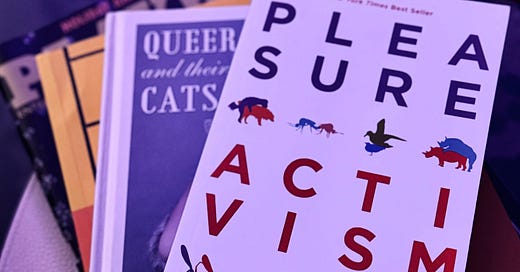Dear sexy people,
Underneath the appurtenances of stripping—the lash extensions, the matte red lip and winged eyeliner that grows in proportion to my impatience, the manicured nails, the partially tamed hair, the micro bikinis revealing fresh bruises from pole tricks—I often feel like a dusty Cheeto or dirty napkin.1 I mean this not as a bizarre commentary on my appearance but metaphorically, in the ontological sense, as a mode of being that is the antecedent or remainder of snacks, stains, sweat, mascara. Napkin Manifestos is an antidote to my intrinsic anxiety of creating mess, an attempt to revel in my own messy pleasures, scribbled down, soaked, sappy, sweeping declarations of hopeful desires. Even reviewers of my academic work have characterized it as animated by, in the words of one scholar, a “romantic optimism” that is at its best “electrifying” but always cursory, incomplete, gestural. Neon stage lights spark and flash but also distract.
Once, in college, my literary magazine co-editor and I had a furtive romance, sexy in that we slunk around like apparitions of our school selves, for a late ramen dinner in Little Tokyo or at a dive bar on York Boulevard, where we wrote manifestos glowing dim red on cocktail napkins. Yet our whiskey- and word-drunk lips never touched—despite the heat between them, that unbearable hunger of deferral, of endless anticipation—because he finally and abruptly admitted to having a long-distance girlfriend. I have a special talent for crushing hard on emotionally (or otherwise) unavailable people.
What he never admitted to me is that the glossy full-color magazine of which I was so proud was funded entirely not by the donors he claimed to have procured with his fundraising powers, but himself. I found this out when the faculty advisor was furious, at clueless lovesick me, of course. Post-publication he mysteriously bounced, escaping censure and the frustrated poetry professor his distraught almost-lover had so desperately wanted to impress. I’ll never know whatever happened to him or why he lied about spending his own money to print our gorgeous issue; perhaps it was the inherited wealth I imagined he had like so many students I met at the private college I attended (thanks to a modest scholarship and massive debt), or pride, or love that drove him to do it. I think at the time I believed, or wanted to believe, it was the latter, as I have a penchant for romance.
That is, until I started working at a strip club. One of the job hazards least discussed in my experience is how sex work can nearly obliterate the concept of genuine chemistry and emotional connection with, at the very least, cis het men. As a wise friend once said to me, and I know it sounds like a harsh overgeneralization but for context she was mostly referring to bros, their gaping-mouthed floppy fish pics, and the endless frustration of dating apps, “Men are trash and love is a lie.” Other than the unofficial (or maybe even official? IDK) motto of strippers, “Fuck you, pay me,” my friend’s saying could easily be a close second.
Here, wearing eight-inch Pleaser heels, I playact the Lacanian (and capitalist) premise of desire as lack. This psychoanalytic theory of pleasure, in fact, underlies the club’s business model and social dynamic. Stripping lays bare the ways heterosexual relationships, paid or unpaid, cannot be disentangled from the real work of managing cisgender men’s expectations around pleasure. Before ever stepping foot in a club, femmes receive an early education in the survival strategy of deferral, a sinister dance of deflecting unwanted sexual attention in the workplace or elsewhere.
Stripping has therefore confronted me with my felt experience of how men expect femmes to conform to gendered expectations of desirability; this ability to shapeshift, for better or worse, prepared me for stripping more than any YouTube video on floorwork I watched religiously before auditioning, absent any pole knowledge. During my audition I rolled around stage frantically like Animal from the Muppets. But I knew how to dress and deflect, how to smile and mirror. The manager who hired me proclaimed “you can teach a girl to dance, but you can’t teach her to be pretty.” Except, I thought, that is the whole purpose of a thriving beauty industry that commands its target audience to buy stupid shit off the Internet in a masochistic pursuit of aspirational attractiveness.
Leaning into my queerness in my 20s exposed me to a broader set of possibilities around my gender expression. I do not intend to conflate gender expression and sexual orientation, which are, of course, distinct. But destabilizing one can sometimes impact the other. I experimented with backward baseball caps and skinny ties in order to reckon with and, ultimately, more fully embrace femmeness for my own pleasure. Once a girlfriend disturbed the sense of intacommunal safety that facilitated my experimentation by attempting to circumscribe its bounds. Despite the ubiquity of stifling gender roles, this period of self-exploration solidified for me that identifying as femme feels crucial to my own sense of embodied pleasure, refusing rather than rehearsing heteroscripts as commodity and currency. But at the club, even if I replicate normative beauty standards on my own terms, I am well aware of how it pays to wear a contorted version of my femmeness, albeit with that consciousness granting some degree of irony.
Another uncomfortable truth about stripping is that sometimes fake flirting with customers feels a little like actual dating used to feel like with men. Being hyperaware of the artificial layers of romance mythology, the validation that being desired can bestow and what it can destroy, makes it harder to date now, not to mention almost logistically impossible while stripping five nights a week. Yet another uncomfortable truth: I often relate to old men because, well, they share my dad’s cultural and musical interests. Mention Woodstock ‘69 or one too many psychedelic rock and metal bands, though, and you’re done for: nothing is a boner killer like asking the age of a woman’s father, a woman who you, in your stupor of dimly lit delusion, estimated was years younger than she is. Daddy issues, maybe, but what about his?
Raechel Anne Jolie’s “the lives we choose” has helped me think through how sex work can alter our relationship to our own bodies in complicated ways, alternately affirming and alienating. For me, while there is an autoerotic element of performing pleasure, the way that pleasure circulates in a sexual economy that trucks with the worst tendencies of heteropatriarchal racial capitalism can deaden the senses, replacing artistic expression with the ritualized reiteration of scripted fantasies. Of course, I am not making a new point here—the commodification of any idea risks defanging its sensual, spiritual, and social possibilities. But there are specific ways this plays out in the embodied experiences of sex workers, and feeling seen can be a lifeline when one returns home from a shitty shift at a job that has as its prerequisite the ability to be unseen, to make artifice sexy, to sell a fantasy to men who often expect you to entertain them for free.
I have been wondering how much it has effed me up, to feel desired but not loved. Through a spoof on genre in a silly Instagram post, I recently attempted to ease this feeling, its heaviness and history. Most disturbing to me some nights is the knowledge of how often I have—as a people-pleasing femme socialized to contort myself for the comfort of others—offered myself up in this way without any expectation of reciprocity, much less return.
Moreover, as I contemplated this set of questions, the Long Beach Anarchist Collective voted on adrienne maree brown’s Pleasure Activism: The Politics of Feeling Good and “Death of a Gentleman” by yours truly as their book club reading selections this month. If you’re local, please join us! I am so honored that my writing on gendered emotional labor in academia and sex work is resonating with people.
As I revisit Pleasure Activism, I’ve been listening to mind-blowing interviews with adrienne maree brown, whose offerings have me thinking about an orgasmic orientation to relationality and to life itself, the role of moderation and excess, and a state of self-connection as the precondition for trusting others. In addition, I have been sitting with Margeaux Feldman’s important work on intimacy, trauma, and healing; for example, I was deeply moved by their pieces “Ambivalent Desires, Ugly Sex” and “The Ways We've Been Taught to Love Aren't Okay. They're Traumatizing.”
I know I typically share excerpts from my manuscript in progress but these ideas have been rattling around my brain, and will surely appear in the memoir. In fact, this reflection on messy desires grew so unwieldy that I finally decided to stop delaying its publication and break it up into multiple posts. I’m slowly finding my flow, though, with a regular publication schedule. While I’ve managed to produce six posts in the month and a half I’ve been doing this (counting this late one), the actual publication dates have been erratic. My plan moving forward is to publish (an alternately public and paid post) every Wednesday, before my work week starts at the club, or to cleave as closely to that as possible given my neurospicy struggles. How does that sound to you? Super open to your feedback always and especially since I’m new to this platform!
Writing this newsletter has motivated me to dedicate daily time to my memoir and served as an anchor amid a lot of personal upheaval. So, I want to express again how truly grateful I am that you’re here. I feel so lucky to be in conversation with y’all, and would love to know what this meandering reflection on pleasure and/as labor brings up for you in the comments.
Thank you for reading, supporting, and sharing my work! Stay tuned for the next post as I continue to explore desire through topics as disparate as Olive Garden, Frantz Fanon, Bridgerton, The Bachelorette, and Chappell Roan.
xx,
Alison
Napkin Manifestos existed prior to the publication of Kathleen Hanna’s memoir, so I screamed in delight when the punk singer and former stripper describes feeling “sometimes more like a dirty napkin than a rebel girl.”





Incredible writing, friend. And relatable as always!!
This is brilliant. So well written and so personal. Disturbing, too.
I'm curious about how your title, "Love in the Time of Stripping" relates to these words of yours: "Most disturbing to me some nights is the knowledge of how often I have—as a people-pleasing femme socialized to contort myself for the comfort of others—offered myself up in this way without any expectation of reciprocity, much less return." Do you think heterosexual love is lost to you? (I'm not saying you're looking, either), and if so, do you think stripping played any causal role in that? or was it purely the insights you got from stripping? (If you don't mind my asking.)